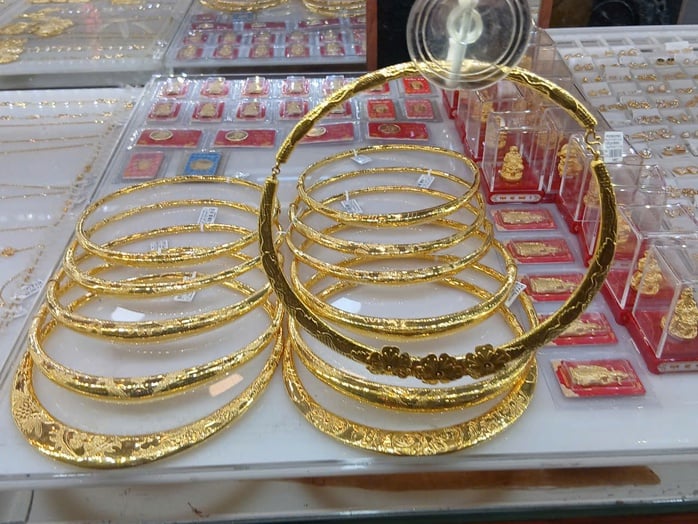Some National Assembly delegates said that it is unreasonable for people to be taxed 0.1% on gold for saving purposes. This regulation should also be implemented with a clear distinction between speculative activities and hoarding issues to avoid affecting people who buy gold for saving purposes.

The law needs to set a certain transaction value threshold to determine tax obligations for gold sellers.
Giving further comments on tax regulations, Mr. Tran Huu Dang, General Director of AJC Gold and Gemstone Joint Stock Company, said that if tax exemption is given to those who buy gold to save but tax is imposed on investors, it will easily create unfairness in tax obligations. Because in reality, some people say they buy gold to "save" or as a wedding gift but in fact it is an investment to make a profit; while others actually buy it to save, but when needed, they are forced to sell it. "It is very difficult for the management agency to determine who is an investor and who is hoarding it for protection," Mr. Dang said.
According to him, the reasonable solution is to establish a transparent transaction mechanism, requiring gold purchases and sales to be paid through banks with full documents, clearly showing the purchase price, sale price and personal information. When the seller of gold has a value of 500 million VND or more, that transaction is considered an investment and must pay tax of 0.1% on the value, regardless of profit or loss. At the same time, commercial banks will report data to the State Bank, helping tax authorities clearly determine the tax obligations of each individual.
From another perspective, Mr. Nguyen Van Duoc, General Director of Trong Tin Tax Consulting and Services Company Limited, commented that taxing the difference between buying and selling is currently very difficult to implement, because many people bought gold many years ago, when the system of documents and invoices was not yet synchronized. Therefore, the tax authority has no basis to accurately determine the cost price to calculate taxable income.
Mr. Duoc also pointed out that in the past, gold bars were considered currency, and people selling gold meant exchanging money, so they did not have to pay taxes. But now, gold is considered a commodity, so the act of selling gold is essentially a transfer of assets, similar to selling stocks or second real estate. Therefore, whether people make a profit or a loss, they should still pay taxes to ensure fairness in tax obligations.
However, to avoid misusing gold buyers for savings, Mr. Duoc believes that the law needs to clearly stipulate a transaction value threshold. "If this threshold is exceeded, the gold seller is considered an investor and must pay tax; small, savings-based transactions should be exempt from tax," he said.
Source: https://nld.com.vn/de-xuat-ban-vang-500-trieu-dong-tro-len-moi-nop-thue-196251106122636879.htm




![[Photo] Prime Minister Pham Minh Chinh chairs the 15th meeting of the Central Emulation and Reward Council](/_next/image?url=https%3A%2F%2Fvphoto.vietnam.vn%2Fthumb%2F1200x675%2Fvietnam%2Fresource%2FIMAGE%2F2025%2F11%2F27%2F1764245150205_dsc-1922-jpg.webp&w=3840&q=75)

![[Photo] President Luong Cuong attends the 50th Anniversary of Laos National Day](/_next/image?url=https%3A%2F%2Fvphoto.vietnam.vn%2Fthumb%2F1200x675%2Fvietnam%2Fresource%2FIMAGE%2F2025%2F11%2F27%2F1764225638930_ndo_br_1-jpg.webp&w=3840&q=75)

















































































![[Photo series] Watching the sunset at Long Thanh Airport construction site](https://vphoto.vietnam.vn/thumb/402x226/vietnam/resource/IMAGE/2025/11/27/1764254151573_anh_5_20251127205055_20251127212613.jpeg)
















Comment (0)